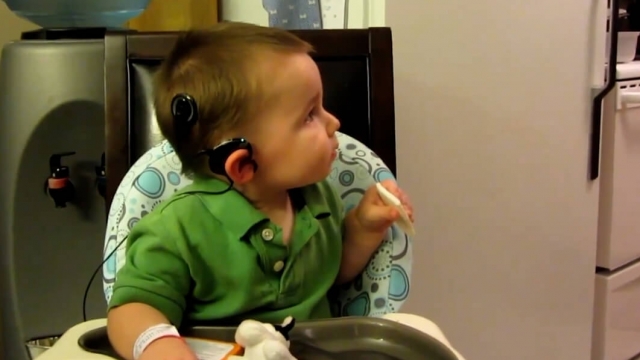Zenek Luci was born deaf to a family in Welland, Ontario. He used hearing aids as an infant before receiving a cochlear implant in an operation, his father, Gabriel, says.
"He was about one year old when it was turned on," Gabriel says. "When it's first turned on, they do a mapping, so they they start really low and see where they're responding to the sound."
Invented in 1957, cochlear implants are worn by more than two hundred thousand Americans, according to the American Cochlear Implant Alliance, an industry trade group.
Viral videos of patients receiving cochlear implants and hearing for the first time pack an emotional punch. It's a technology that's transforming lives—and one that's long stirred debate within the Deaf community. Dr. Samantha Kesteloot, an audiologist, educates families about implants and wears one herself.
"There's an internal part and external part," she explains. "The internal part is surgical, and there's an electrode array that is inserted into the cochlea, which is the organ of hearing."
"The outside part is a processor, which sort of looks like a hearing aid," she says. "That picks up the acoustical sound and converts it to electrical stimulus, and then those signals are sent down the electrode array and electrically stimulate the auditory nerve." That's the nerve that sends signals to the brain that correspond to the sensation of hearing.
Many adults with hearing loss say the implants have dramatically improved their lives.
Lou Ferrigno, the actor who once portrayed the Incredible Hulk, recently told students who were deaf or hard of hearing, and how implants have helped him. They "changed my life tremendously," he said. "There's so much hope that people can have better hearing, better lifestyle."
Dr. Keseloot, meanwhile, received her implant in 2017.
"It's completely changed my life," she says. "I always was a pretty high achiever with hearing aids, but I was always just kind of missing out on a lot of social things." Dr. Kestellot says she would "just sort of smile and nod and pretend I understood." Now, she says, "I can keep up in noisy situations."
SEE MORE: Parents push for insurers to cover pediatric hearing aids
Roughly one in five Americans has some form of hearing loss, according to the National Institutes of Health. And there is a thriving Deaf community in the U.S. that communicates with sign language. So adults who are eligible for implants have the choice of whether they want to receive them.
There's considerable debate, however, around their use with kids.
The FDA has approved the technology for children as young as nine months.
Without Zenek's implant, using just the hearing aid, "Everything he said was gibberish," says Gabriel Luci. "So that told us, okay, he's not getting enough with the aid."
"If a family desires listening in spoken language outcomes, the natural goal for the child is to speak and listen," says Dr. Kesteloot. "The best route is to aid and then implant if the hearing aids not doing enough. And then if the child chooses to sign later or, you know, and refuses the implant later, that's a choice that they can make."
Some parents of deaf children decline the procedure, says Dr. Kesteloot, including parents who are deaf themselves. "A lot of culturally deaf parents choose not to implant their children because they don't really have a need for it. Their life is based around sign language," she says. "And then also, some parents believe that the child should make the decision when they get old enough to make the decision. And that's, you know, a little tricky because there is a critical period for language development."
Dorian Smith Garcia wrote recently that videos celebrating cochlear implants "play into audism," which implies that people with hearing loss need to be "cured or corrected."
Academy Award winner Marlee Matlin, who is Deaf, says she isn't opposed to cochlear implants. But she told the World Science Festival in 2019 that Deaf culture built on sign language offers immense rewards for children.
"There is still a great deal of pressure that people should explore the option of cochlear implants because that's better than signing, that you shouldn't sign," she told the audience. "I would say to these people, who are you to decide for us?"
Gabriel Luci, who has a second child with implants named Sasha, says the decision should be up to every parent of a Deaf child.
"I do believe that getting my kids cochlear implants gives them more opportunities, though. I'm not taking away any opportunities from them; I'm only giving them opportunities," he says.
Trending stories at Scrippsnews.com




